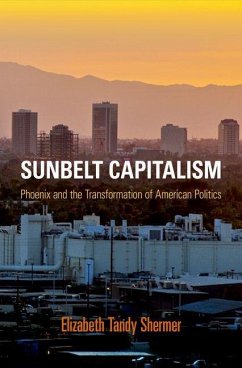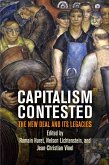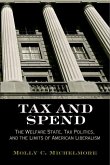Few Sunbelt cities burned brighter or contributed more to the conservative movement than Phoenix. In 1910, eleven thousand people called Phoenix home; now, over four million reside in this metropolitan region. In Sunbelt Capitalism, Elizabeth Tandy Shermer tells the story of the city's expansion and its impact on the nation. The dramatic growth of Phoenix speaks not only to the character and history of the Sunbelt but also to the evolution in American capitalism that sustained it.
In the 1930s, Barry Goldwater and other members of the Phoenix Chamber of Commerce feared the influence of New Deal planners, small businessmen, and Arizona trade unionists. While Phoenix's business elite detested liberal policies, they were not hostile to government action per se. Goldwater and his contemporaries instead experimented with statecraft now deemed neoliberal. They embraced politics, policy, and federal funding to fashion a favorable "business climate," which relied on disenfranchising voters, weakening unions, repealing regulations, and shifting the tax burden onto homeowners and consumers. These efforts allied them with executives at the helm of the modern conservative movement, whose success partially hinged on relocating factories from the Steelbelt to the kind of free-enterprise oasis that Phoenix represented. But the city did not sprawl in a vacuum. All Sunbelt boosters used the same incentives to compete at a fever pitch for investment, and the resulting drain of jobs and capital from the industrial core forced Midwesterners and Northeasterners into the brawl. Eventually this "Second War Between the States" reoriented American politics toward the principle that the government and the citizenry should be working in the interest of business.
In the 1930s, Barry Goldwater and other members of the Phoenix Chamber of Commerce feared the influence of New Deal planners, small businessmen, and Arizona trade unionists. While Phoenix's business elite detested liberal policies, they were not hostile to government action per se. Goldwater and his contemporaries instead experimented with statecraft now deemed neoliberal. They embraced politics, policy, and federal funding to fashion a favorable "business climate," which relied on disenfranchising voters, weakening unions, repealing regulations, and shifting the tax burden onto homeowners and consumers. These efforts allied them with executives at the helm of the modern conservative movement, whose success partially hinged on relocating factories from the Steelbelt to the kind of free-enterprise oasis that Phoenix represented. But the city did not sprawl in a vacuum. All Sunbelt boosters used the same incentives to compete at a fever pitch for investment, and the resulting drain of jobs and capital from the industrial core forced Midwesterners and Northeasterners into the brawl. Eventually this "Second War Between the States" reoriented American politics toward the principle that the government and the citizenry should be working in the interest of business.
Dieser Download kann aus rechtlichen Gründen nur mit Rechnungsadresse in A, D ausgeliefert werden.









